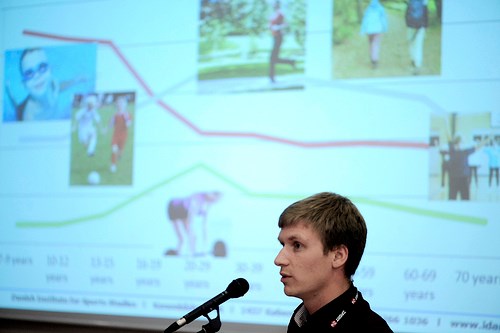Mega-events do not have a trickle-down effect on sports participation

Trygve Buch Laub from the Danish Institute for Sports Studies talks about the trickle-down effect. Photo: Play the Game / Thomas Søndergaard
31.10.2013
By Kirsten SparreThe idea of the trickle-down effect posits that exposure to elite sports - particular in connection with mega-events - will make people want to take up that sport due to its newfound popularity. However, Koen Breedveld, director of the Mulier Institute in the Netherlands, dismissed the trickle-down effect completely.
"Forget about trickle-down effects. They do not happen," he said and backed it up with findings from a recent evaluation of the effects of the 2012 Olympic Games in London on mass participation in sport.
80 per cent of clubs in London reported that they did not see the Games as an opportunity to increase participation in their activities, and 21 out of 26 types of sport did not experience an increase in membership following the Olympic Games.
"There was no big increase in sports participation during the years the Games were planned and executed. It was very disappointing," Breedveld said.
In Breedveld's view, mega-events fail to produce a trickle-down effect on mass participation in sport because sports participation for most people is rooted in long established habits from childhood and is influenced by many social factors and time constraints. It is also completely dependent on whether sports federations, clubs, and municipalities have set up the appropriate infrastructure that allows people to take up a particular sport.
"If mega-events have an effect on sports participation, it is because they can persuade people who are already active in sports to take up another sport or set new goals. Mega-events will not raise sport participation levels in general," Breedveld declared.
Some effect in Denmark - but only short term
Trygve Buch Laub from the Danish Institute for Sports Studies has also tried to test the theory of the trickle-down effect.
Sports participation in Denmark is quite high. 64 per cent of the adult population play sports at least once a week, and participation rates among children are even higher. The question for Laub and his colleagues was whether the high participation rates have been inspired by elite sport events.
"Our research shows that elite sport does inspire certain groups to some extent, particularly teenage girls and boys and men from the age of 7 to 29. It particularly applies to the most popular sports that are covered heavily by the media such as handball, table tennis, and football," Laub explained.
However, the effects are dubious, short term and seemingly based solely on media coverage, Laub continued.
The research led him and his colleagues to look at the question from another angle. The rise in sports participation from 2007 to 2011 consists primarily of runners in their 20s, 30s and 40s.
"Running inspires mass participation, which on the other hand has led to a massive rise in running events. So in terms of understanding the effects of mass events on sports participation, it might be more interesting to study the effects of mass events where people are participants rather than spectators," Laub suggested.





